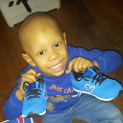The Impact Of CD56neg NK Cells in the Pathogenesis of Endemic Burkitt Lymphoma

Background:
Endemic Burkitt lymphoma (eBL) is the most common childhood cancer in Africa. This cancer is treatable with chemotherapy, but the survival rate for African children is 50%, in contrast to 90% survival for American children. This could be due to two common childhood infections that are considered risk factors for eBL, namely malaria and Epstein-Barr virus (EBV). A healthy immune system is able to recognize and kill human cells that have become infected or have become cancer cells. The children who get eBL live in areas of Africa where they get several malaria infections each year. They also get infected with EBV when they are infants. We think that when these children are fighting malaria, their immune cells become unadapted so they are not as able to kill efficiently cells that are infected with EBV. Normally, EBV does not cause any illness in infants but EBV can cause normal B cells to become cancer cells. Endemic BL is a B cell cancer that is almost always infected with EBV. If the immune system has been weakened, then it’s more likely the person could develop cancer.
Project Goal:
To determine why the immune system for children who get eBL is not protecting them. If we can determine which parts of the immune system are important for fighting eBL, then we can determine other therapies that can be given to improve survival for these children.

